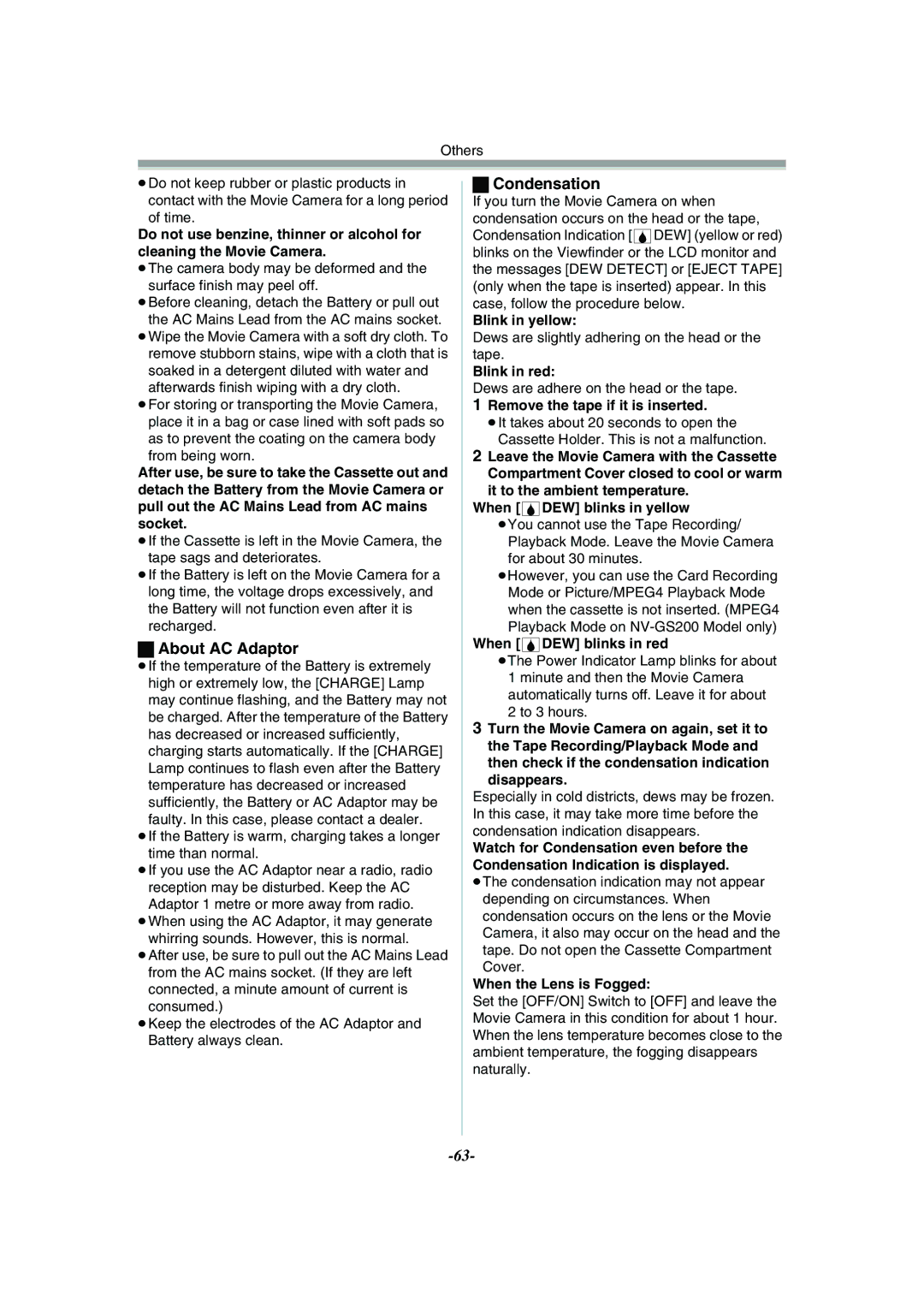
Others
≥Do not keep rubber or plastic products in contact with the Movie Camera for a long period of time.
Do not use benzine, thinner or alcohol for cleaning the Movie Camera.
≥The camera body may be deformed and the surface finish may peel off.
≥Before cleaning, detach the Battery or pull out the AC Mains Lead from the AC mains socket.
≥Wipe the Movie Camera with a soft dry cloth. To remove stubborn stains, wipe with a cloth that is soaked in a detergent diluted with water and afterwards finish wiping with a dry cloth.
≥For storing or transporting the Movie Camera, place it in a bag or case lined with soft pads so as to prevent the coating on the camera body
from being worn.
After use, be sure to take the Cassette out and detach the Battery from the Movie Camera or pull out the AC Mains Lead from AC mains socket.
≥If the Cassette is left in the Movie Camera, the tape sags and deteriorates.
≥If the Battery is left on the Movie Camera for a long time, the voltage drops excessively, and the Battery will not function even after it is recharged.
ªAbout AC Adaptor
≥If the temperature of the Battery is extremely high or extremely low, the [CHARGE] Lamp may continue flashing, and the Battery may not be charged. After the temperature of the Battery has decreased or increased sufficiently, charging starts automatically. If the [CHARGE] Lamp continues to flash even after the Battery temperature has decreased or increased sufficiently, the Battery or AC Adaptor may be faulty. In this case, please contact a dealer.
≥If the Battery is warm, charging takes a longer time than normal.
≥If you use the AC Adaptor near a radio, radio reception may be disturbed. Keep the AC Adaptor 1 metre or more away from radio.
≥When using the AC Adaptor, it may generate whirring sounds. However, this is normal.
≥After use, be sure to pull out the AC Mains Lead from the AC mains socket. (If they are left connected, a minute amount of current is consumed.)
≥Keep the electrodes of the AC Adaptor and Battery always clean.
ªCondensation
If you turn the Movie Camera on when condensation occurs on the head or the tape, Condensation Indication [3DEW] (yellow or red) blinks on the Viewfinder or the LCD monitor and the messages [DEW DETECT] or [EJECT TAPE] (only when the tape is inserted) appear. In this case, follow the procedure below.
Blink in yellow:
Dews are slightly adhering on the head or the tape.
Blink in red:
Dews are adhere on the head or the tape.
1Remove the tape if it is inserted.
≥It takes about 20 seconds to open the Cassette Holder. This is not a malfunction.
2Leave the Movie Camera with the Cassette Compartment Cover closed to cool or warm it to the ambient temperature.
When [3DEW] blinks in yellow ≥You cannot use the Tape Recording/
Playback Mode. Leave the Movie Camera for about 30 minutes.
≥However, you can use the Card Recording Mode or Picture/MPEG4 Playback Mode when the cassette is not inserted. (MPEG4 Playback Mode on
When [3DEW] blinks in red
≥The Power Indicator Lamp blinks for about 1 minute and then the Movie Camera automatically turns off. Leave it for about 2 to 3 hours.
3Turn the Movie Camera on again, set it to the Tape Recording/Playback Mode and then check if the condensation indication disappears.
Especially in cold districts, dews may be frozen. In this case, it may take more time before the condensation indication disappears.
Watch for Condensation even before the Condensation Indication is displayed. ≥The condensation indication may not appear
depending on circumstances. When condensation occurs on the lens or the Movie Camera, it also may occur on the head and the tape. Do not open the Cassette Compartment Cover.
When the Lens is Fogged:
Set the [OFF/ON] Switch to [OFF] and leave the Movie Camera in this condition for about 1 hour. When the lens temperature becomes close to the ambient temperature, the fogging disappears naturally.
